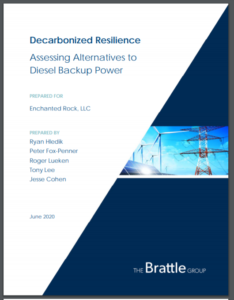Full Title: Decarbonized Resilience: Assessing Alternatives to Diesel Backup Power
Author(s): Ryan Hledik, Peter Fox-Penner, Roger Lueken, Tony Lee, & Jesse Cohen
Publisher(s): The Brattle Group
Publication Date: May 25, 2020
Full Text: Download Resource
Description (excerpt):
Improved resilience has emerged as a top priority for the U.S. power grid. Efforts to mitigate wildfire risk in Northern California last year led to hundreds of thousands of electricity customers being disconnected from the grid. During hurricane season, customers in the Eastern and Southern U.S. often face the associated threat of multi-day power outages. In many other parts of the country, portions of the local power grid are susceptible to interruptions due to a variety of other factors. Improved resilience would reduce or avoid those outages, allowing industries, businesses, and households to maintain their uninterrupted supply of electricity.
Resilience can be improved through the deployment of microgrids, among other options such as vegetation management and circuit hardening. Microgrids have been described in a wide variety of ways. Simply put, the term “grid” refers to a combination of power generation, customers who consume the power, wires that deliver the electricity to customers, and a control system that manages this process. As discussed in this paper, a microgrid simply is a small, self-sufficient grid.
